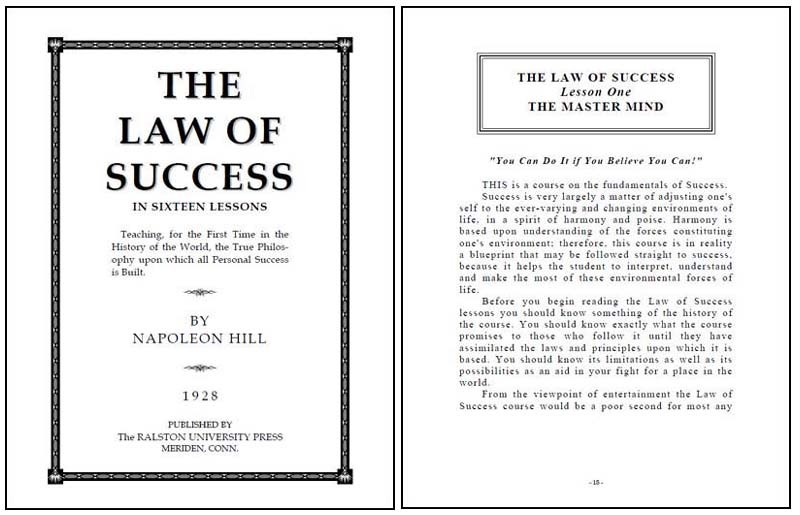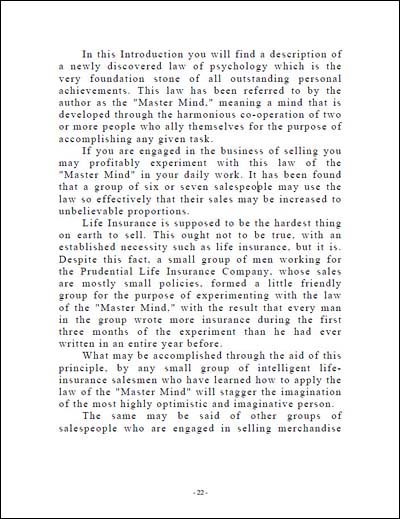Napoleon Hill’s Definition of the Master Mind vs Modern Mastermind
Over the past several months, I’ve been immersing myself into the deep study of Napoleon Hill’s definition of the Master Mind, as described in his 1928 book, Law of Success. Interestingly, Law of Success preceded Hill’s more famous, Think and Grow Rich, by 12 years (the first edition of Law of Success was released for a private few in 1925). I will reveal why this may be important to you shortly.
I will start by acknowledging that the concept of strategic peer alliances was around for hundreds, if not thousands, of years before Hill formally introduced the concept. As a matter of fact, the original 1925 edition of Law of Success only contained 15 “laws” and it did not go into detail on the definition of the Master Mind. It wasn’t until Hill published an updated, public version, in 1928, where he introduced a 16th law - the “psychological law referred to as the ‘Master Mind.’”

In the introduction to 1928 edition of Law of Success, Hill writes (in third-person voice), “The author lays no claim to having created anything basically new in this course. What he has done, however, has been to organize old truths and known laws into PRACTICAL, USABLE FORM, where they may be properly interpreted and applied by the workaday man whose needs call for a philosophy of simplicity.”

Later in the text, Hill acknowledges the definition of the Master Mind came from the time he spent interviewing with Andrew Carnegie. According to Hill, “In this Introduction you will find a description of a newly discovered law of psychology which is the very foundation stone of all outstanding personal achievements. This law has been referred to by the author as the ‘Master Mind,’ meaning a mind that is developed through the harmonious co-operation of two or more people who ally themselves for the purpose of accomplishing any given task.”
And there you have the very first written description of the Master Mind, that I could uncover in my research, directly from the Hill himself.
Hill later went on to write, “A Master Mind may be created through the bringing together or blending, in a spirit of perfect harmony, of two or more minds. Out of this harmonious blending the chemistry of the mind creates a third mind which may be appropriated and used by one or all of the individual minds. This Master Mind will remain available as long as the friendly, harmonious alliance between the individual minds exists. It will disintegrate and all evidence of its former existence will disappear the moment the friendly alliance is broken.”
He continues by stating, “The Master Mind may be created wherever men blend their minds in a spirit of perfect harmony, with some DEFINITE objective in view.”
And within Hill’s own words you realize what he was truly describing and you are given a checklist of fundamental criteria to look for in a group.
- Is there a definite objective the members are working on?
- Is there a spirit of harmony amongst the members?
- Is there chemistry in the group?
If you fast-forward today, while the value and power of Napoleon Hill's original "Master Mind" concept remains equally valid, the more common, single-word description of "mastermind" is used by most people today to describe Hill's definition of a strategic peer alliance.
While the history and origination of the mastermind is important, what is more important is that if you consider yourself a success-oriented business owner and you are not part of a high-level mastermind group, you are missing out on a huge opportunity for growth and progress. I lead such types of business owner mastermind groups and I also teach business owners how to start their own high-level, high-fee mastermind groups.

Mike, Thanks for sharing! I like to think (and I’m not sure this is accurate to Hill’s way of thinking) that the whole (the Master Mind) is greater than the sum of the parts (the individual people participating). Where one person can share an idea, another person can take that idea and add to it to expand the original thought, then another person has their “Ah Ha!” moment and take it to an even higher level of thought, that none of the individual thinkers would have come up with the final result on their own individually!